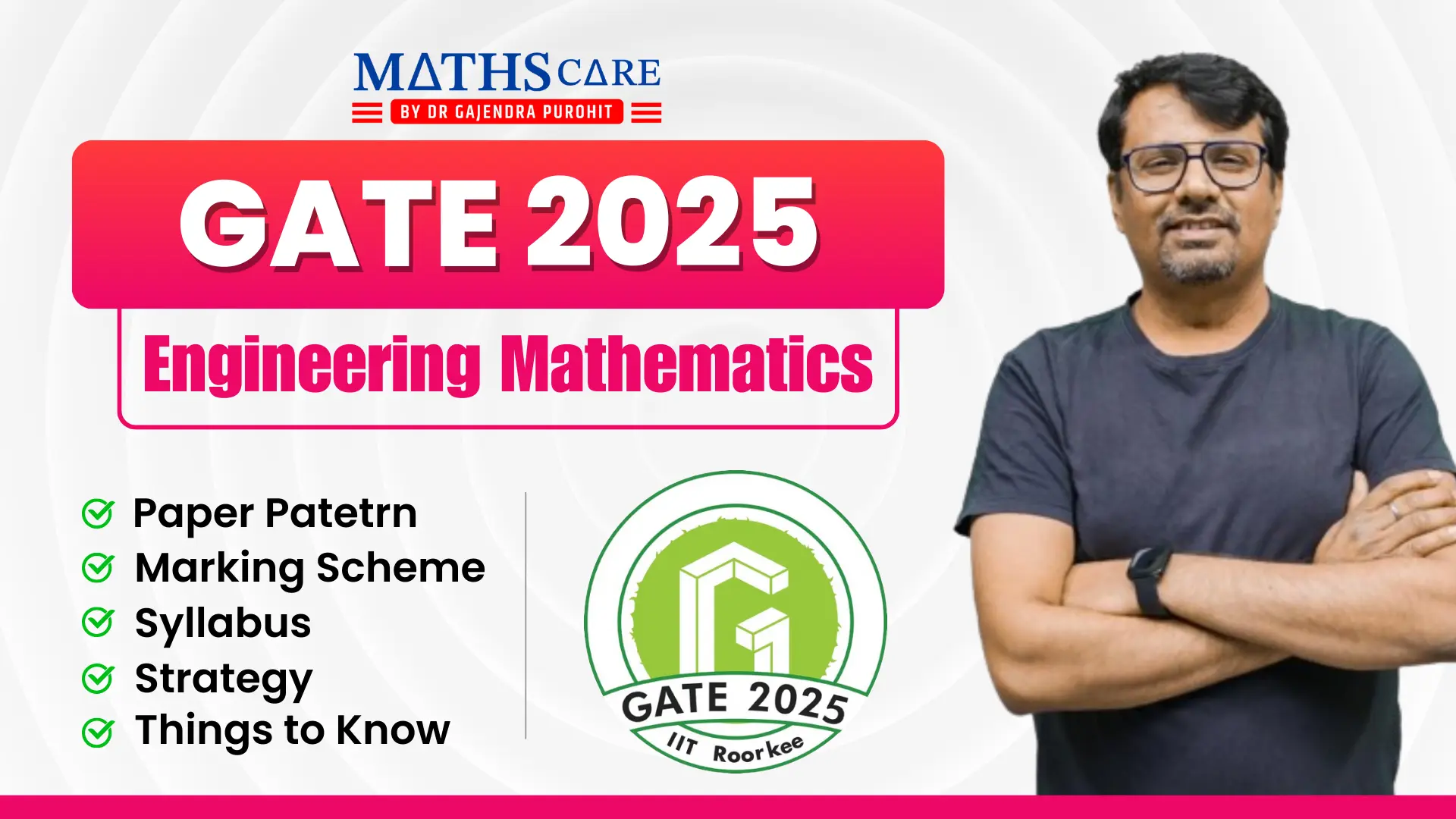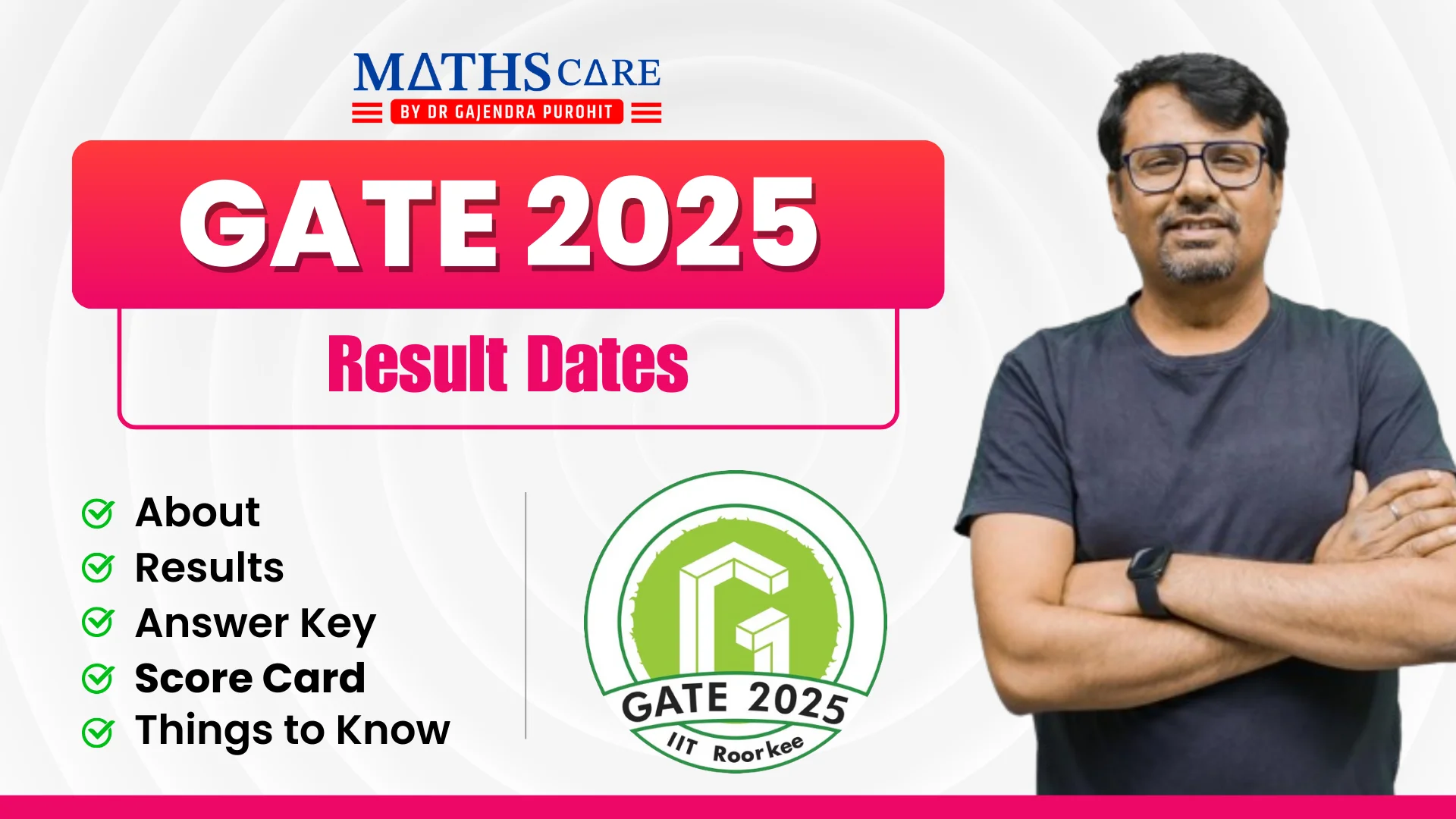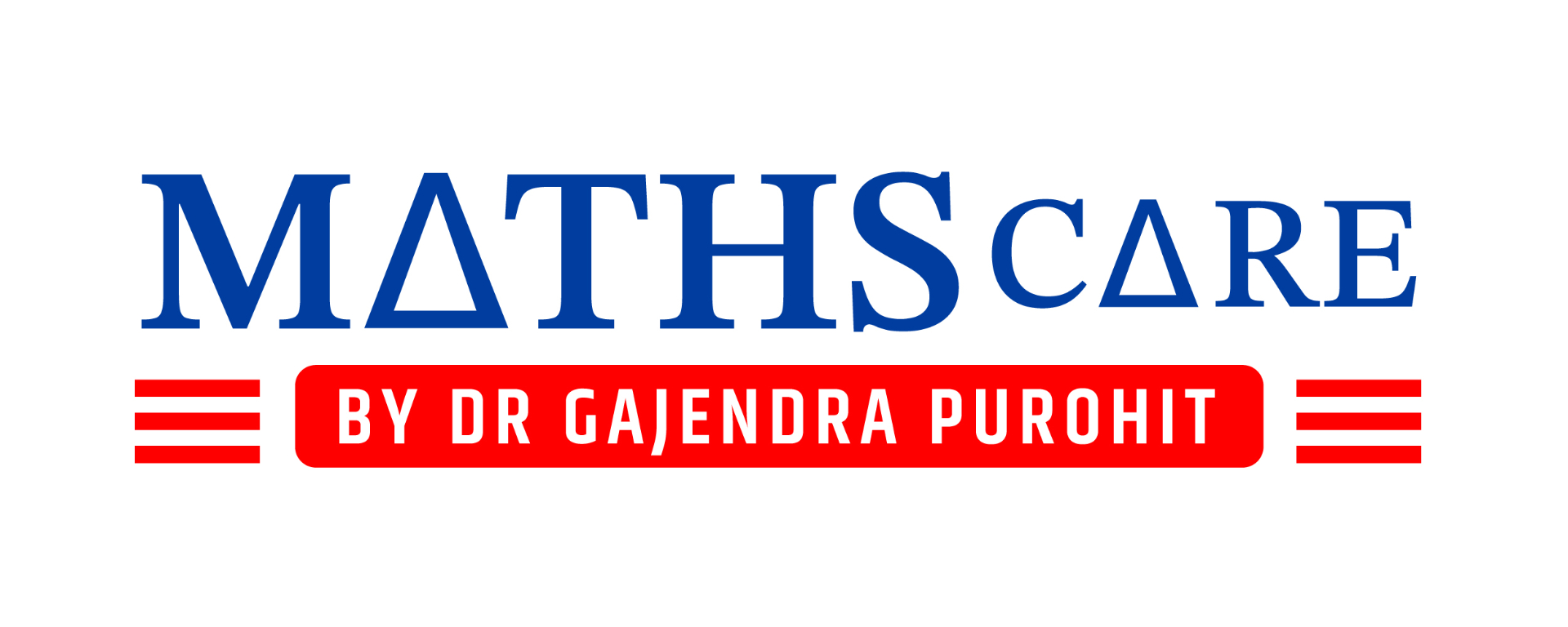GATE Exam 2025 Engineering Mathematics
GATE (Graduate Aptitude Test in Engineering): The Graduate Aptitude Test in Engineering (GATE) 2025 is a prestigious national-level examination that plays a pivotal role in higher education and career advancement for engineering graduates. A significant part of the GATE syllabus for most branches is Engineering Mathematics, which is a high-scoring and conceptual subject. Understanding its weightage, key topics, and preparation strategy can help aspirants score well in this section and secure their dream rank. In this blog, we will cover the GATE 2025 paper pattern, topic-wise analysis, and preparation tips to ace Engineering Mathematics.

- 1. GATE 2025 Paper Pattern Overview
- 2. GATE Exam 2025 Engineering Mathematics: Weightage and Importance
- 3. GATE Exam 2025 Topic-Wise Distribution of Marks
- 4. GATE Exam 2025 Important Topics to Focus On
- 5. GATE Exam 2025 Preparation Strategy for Engineering Mathematics
- 6.GATE Exam 2025 Engineering Mathematics Importance
- GATE FAQS
1. GATE 2025 Paper Pattern Overview
The GATE exam evaluates candidates in various technical and aptitude-based areas. It is divided into two main sections:
Section A: General Aptitude (common for all papers)
Section B: Subject-Specific questions
The questions are categorized into:
Multiple Choice Questions (MCQs)
Multiple Select Questions (MSQs)
Numerical Answer Type (NAT) questions
Marking Scheme:
+1 mark for correct answers and -1/3 mark for incorrect answers (for 1-mark questions)
+2 marks for correct answers and -2/3 mark for incorrect answers (for 2-mark questions)
Understanding the structure of the exam ensures candidates can manage time and focus effectively.
2. GATE Exam 2025 Engineering Mathematics: Weightage and Importance
Engineering Mathematics is a mandatory section for most GATE papers, carrying a weightage of approximately 13-15 marks. Given the consistent presence of this subject, performing well here can provide a competitive edge.
For example, in popular streams like Computer Science and Information Technology (CS), where over 1.2 lakh candidates appear annually, Engineering Mathematics contributes 13 marks on average. Similarly, branches like Civil Engineering (CE) and Mechanical Engineering (ME) witness heavy competition, with thousands of aspirants. Even smaller branches, such as Aerospace Engineering (AE) and Agricultural Engineering (AG), allocate 13 marks to this section, making it crucial across all disciplines.
Scoring well in Engineering Mathematics can be decisive due to its predictable and consistent weightage, offering aspirants a great opportunity to boost their overall scores with focused preparation.
3. GATE Exam 2025 Topic-Wise Distribution of Marks
Analyzing previous years’ papers reveals the topic-wise distribution of marks in Engineering Mathematics.
Key topics such as Linear Algebra consistently dominate the paper, with marks ranging between 13 to 18 across recent years. Calculus and Differential Equations follow closely behind, with a weightage of around 7 to 15 marks annually.
Other emerging topics like Probability and Statistics, Vector Calculus, and Numerical Methods have also shown significant importance, contributing anywhere between 5 to 10 marks in the GATE papers. Topics like Complex Variables and Discrete Mathematics (for CS) add additional scoring opportunities, often contributing 4-6 marks.
These trends highlight the importance of prioritizing high-weightage topics like Linear Algebra, Calculus, and Differential Equations while maintaining a balanced focus on other areas.
4. GATE Exam 2025 Important Topics to Focus On
Here is a breakdown of the most important topics for GATE 2025 Engineering Mathematics:
Linear Algebra: Matrix operations, eigenvalues, eigenvectors, rank of matrices, and systems of linear equations.
Calculus: Limits, continuity, derivatives, maxima-minima problems, and definite/indefinite integrals.
Differential Equations: First and higher-order differential equations, solutions to linear ODEs.
Vector Calculus: Gradient, divergence, curl, and surface integrals.
Probability and Statistics: Mean, variance, probability distributions, and statistical measures.
Numerical Methods: Newton-Raphson method, interpolation, and numerical integration.
Complex Variables: Analytic functions, Cauchy’s theorem, and contour integration.
Discrete Mathematics (for CS): Graph theory, set theory, and combinatorics.
Mastering these topics with conceptual clarity and rigorous practice ensures high accuracy in the GATE exam.
5. GATE Exam 2025 Preparation Strategy for Engineering Mathematics
To ace Engineering Mathematics in GATE 2025, adopt the following detailed preparation strategy:
Analyze Repeated & Important Topics: Carefully examine previous years’ question papers to identify recurring topics and questions. Focus on concepts and problems that consistently appear in the exam, as these are likely to carry significant weightage. Analyzing trends helps you allocate time to high-scoring areas and avoid unnecessary effort on less important topics. By dedicating effort to mastering key topics like Linear Algebra, Calculus, and Differential Equations, candidates can maximize their scores with relatively less preparation time.
Daily 1-2 Lectures with 25-Question Practice: Dedicate time daily to studying 1-2 lectures or topics and reinforce your learning through targeted practice. After completing each topic, solve a minimum of 25 practice questions to solidify your understanding and build speed. Regular practice not only sharpens problem-solving skills but also enhances your ability to recall formulas and concepts quickly. Consistency is the key; dedicating small, focused study sessions daily prevents information overload and leads to better long-term retention of concepts.
Solve PYQs: Solving Previous Year Question Papers (PYQs) is a crucial step in GATE preparation. PYQs provide insights into the types of questions asked, difficulty levels, and topic weightage. Solving these papers under timed conditions simulates the actual exam environment and helps candidates gauge their strengths and weaknesses. Additionally, revisiting solutions and understanding mistakes ensures continuous improvement, making you confident in handling similar questions in the actual exam.
Give Mock Tests & Analyse: Regularly attempt full-length mock tests to evaluate your preparation and improve time management. Mock tests simulate the real exam experience, allowing candidates to fine-tune their accuracy, speed, and endurance. After every test, thoroughly analyze your performance to identify weak areas and revisit those topics for revision. Paying attention to the types of errors made—whether conceptual, calculation-based, or time-related—helps aspirants improve efficiency and overall performance.
Weightage – 13%: Engineering Mathematics typically accounts for 13% of the total marks in the GATE exam. Given its significant weightage, this section can significantly impact your final score. Preparing strategically by focusing on high-weightage topics ensures that you capitalize on this scoring opportunity. Since questions are often direct and formula-based, aspirants who practice regularly can achieve high accuracy and secure maximum marks in this section.
Level of Paper – Moderate to Tough: The difficulty level of Engineering Mathematics in GATE ranges from moderate to tough. While some questions are straightforward and formula-driven, others may involve deeper conceptual understanding and multi-step problem-solving. Preparing for questions of varying difficulty ensures candidates are equipped to tackle both basic and advanced problems. By balancing conceptual clarity with rigorous practice, aspirants can confidently handle the challenges posed in the exam.
6.GATE Exam 2025 Engineering Mathematics Importance
Engineering Mathematics is often termed a ‘decisive factor’ in GATE due to its consistent weightage. Scoring well in this section boosts your overall marks, making it easier to achieve a top rank.
Advantages:
Requires less time for preparation compared to core technical subjects.
High accuracy is achievable with consistent practice.
Direct formula-based questions make it a scoring area.
A strategic focus on Engineering Mathematics can lead to significant improvements in your final GATE score.
7. GATE Exam 2025 Common Mistakes to Avoid
Skipping Basics: Not understanding fundamental concepts leads to mistakes in advanced questions.
Ignoring Previous Year Trends: Topic analysis helps prioritize preparation efficiently.
Neglecting Mock Tests: Not practicing enough NAT and MSQ questions reduces confidence.
Formula Overload: Attempting to memorize without practice leads to confusion during the exam.
Inconsistent Practice: Inconsistency in solving problems weakens conceptual understanding and recall during the exam.
Conclusion
Engineering Mathematics is a high-scoring section in the GATE exam and offers an excellent opportunity to boost your overall rank. By focusing on key topics, solving PYQs, and regularly attempting mock tests, aspirants can build a strong foundation and improve their performance. A strategic and consistent preparation plan tailored to the weightage and difficulty of this subject ensures success in GATE 2025. Start early, stay consistent, and master Engineering Mathematics to achieve your dream GATE score!
GATE FAQS
Log in using your Enrollment ID and password to download the application form.
No, your application will be marked defective, and you’ll be notified to rectify it.
You will be notified via email or SMS to upload a corrected signature before the deadline.
Indian candidates can use Aadhaar-UID, Passport, PAN Card, Voter ID, or Driving License. Foreign nationals can use their passport or other government-issued IDs.
No, EWS candidates must pay the same application fee as general category candidates.
BEST OFFERING COURSES FOR YOU
BEST BOOKS FOR IIT JAM/ CSIR-NET
BUY BOOKS ON OUR APP
RECENT POSTS

GATE Career Opportunities (Updates)

GATE 2025 Financial Assistance









